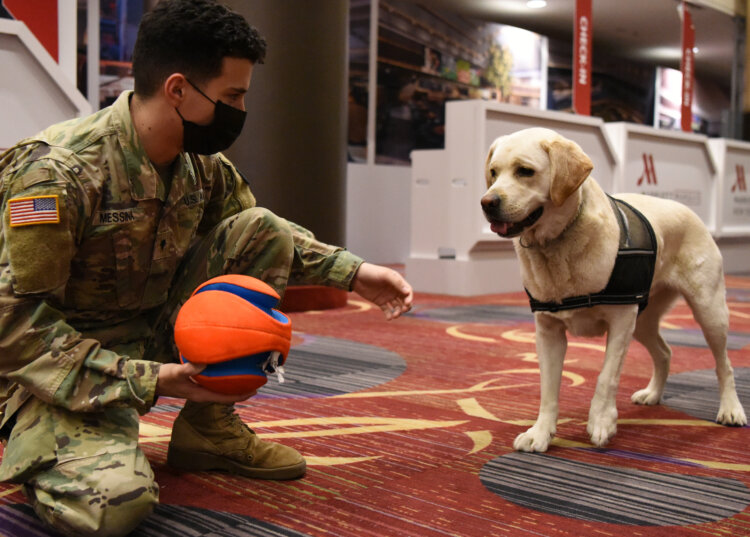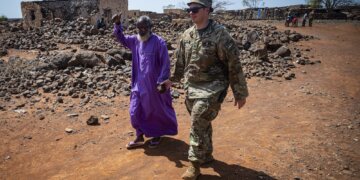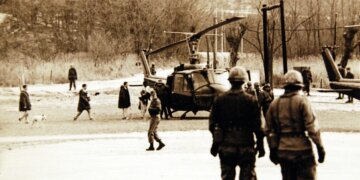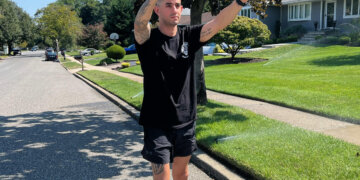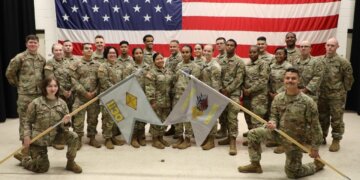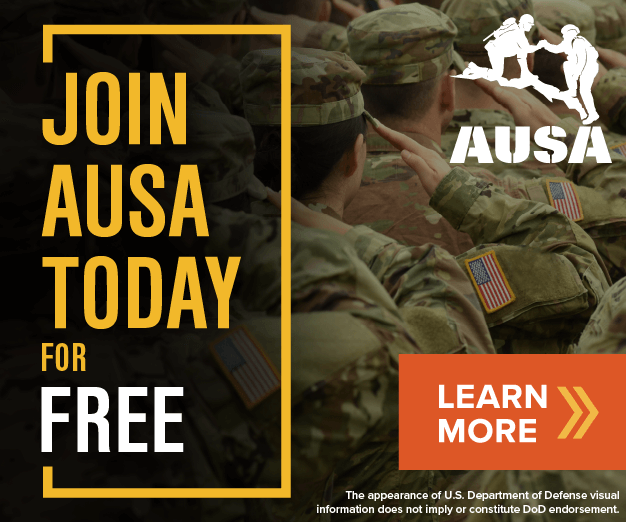NEW YORK – Talking with other guardsmen was the best way to relieve stress after retrieving the bodies of people who died as the COVID-19 pandemic hit New York City, according to a survey of 177 New York National Guard personnel who were part of that 2020 mission.
A paper analyzing the survey and incorporating on-the-ground observations by Army Guard behavioral health officers, was published online April 20 by the Society for Military Psychology’s professional journal “Military Psychology”.
The paper is titled: “National Guard service members decedent recovery and processing operations during the COVID-19 pandemic in New York City.”
It discusses the stresses 410 New York Army and Air Guardsmen dealt with while assisting New York City’s Office of the Chief Medical Examiner, called OCME for short, in retrieving the remains of 2,882 New Yorkers from March to June 2022.
The paper was written by New York Army National Guard Captain Matthew D. Baker and Major Matthew A. Southard, along with psychologists from the Army Public Health Center and Walter Reed Medical Center.
The paper examines the stresses Guardsmen on the mission faced, how they coped, and how leaders sought to help them deal with the task of recovering human remains day-in and day-out for 30 days.
The survey respondents were asked to rate ten different stressors they were exposed to, and to determine what were the most helpful ways to de-stress.
The top stresses of these missions, according to the survey, were unpleasant smells, handling decomposing bodies, seeing the deceased personnel items, and handling the remains of elderly decedents.
RELATED: Air Force Reserve medical officer speaks on COVID-19 response, what’s next
The most effective ways of coping with stress were talking with other Soldiers, talking with family, talking with friends, exercising, and listening to music.
This study—done in conjunction with the active Army—will be useful when other National Guard leaders face a mission like this, Baker and Southard said.
When the National Guard gets a mission, and does well at it, the Guard tends to get that mission again, Baker said.
In March 2020, a dramatic increase in deaths due to the COVID-19 pandemic threatened overwhelm the city’s system of collecting human remains. The New York National Guard was tasked to help.
Initially, a specially trained fatality recovery team from the 107th Attack Wing was sent. But as the workload increased, Soldiers from Army Guard units, like the 369th Sustainment Brigade were called.
Eventually, 410 Soldiers and Airmen worked the mission daily over the course of four months.
Exposure to dead bodies is one of the most traumatic events for combat Soldiers, according to research conducted during Operation Iraqi Freedom. The New York Guardsmen were facing a similar issue in peacetime, in New York City, according to the study.
The Soldiers faced grieving relatives, deteriorating remains, unventilated apartments, and the tough physical work of manhandling a body out of an apartment and down a stairwell.
Baker, a behavioral health officer in the 427th Brigade Support Battalion, and a Veterans Administration psychologist in civilian life, led the behavioral health team working with these troops.
Seven New York National Guard behavioral health providers and two enlisted specialists took part in the OCME mission. At the peak of the response five behavioral health providers were on duty.
Southard, who worked for the New York Police Department and was in the Individual Ready Reserve when the pandemic hit, returned to the Army Guard to take over the mission.
The Guard mental health workers consulted the literature on the subject and spoke with experts—including the American Psychology Association’s Mortuary Affairs Panel– to craft a program designed to reduce stressors, Southard and Baker said.
Alongside military chaplains, they made themselves available around the clock. They went to mortuaries, accompanied Soldiers on retrieval missions and gave leaders a heads up on the signals of overstress on troops.
“Battlefield circulation” was critical in identifying and addressing trauma symptomatology,” Southard said.
The mental health teams worked to get home-cooked meals for the troops, and brough in service dogs to provide some fun during down time.
They also reached out to Army Morale Welfare and Recreation, the Veterans Administration and the USO for support.
Senior leaders visited regularly, which also demonstrated the importance of the mission, Baker said.
And when Soldiers came off the mission, they went through a three-day workshop to decompress and learn how to monitor their mental health.
The teams also screened Soldiers before they went on the mission, to ensure they could handle the mental stress involved, Southard said.
But rules designed to prevent the spread of the COVID-19 virus made it harder for Soldiers to de-stress by hanging out together, Baker and Southard said.
The Soldiers were housed in single rooms in hotels with closed bars and restaurants. There was no place to sit and talk.
Soldiers wound up calling family and friends on their phones to relax. That was very helpful, Baker said. Sitting alone playing video games really wasn’t.
The efforts of the mental health teams addressed the immediate mental health needs of the Soldiers and Airmen, but these situations could cause stress months or years later, according to Baker and Southard.
The survey sent to the troops was designed to see how the Soldiers and Airmen were doing post-deployment and to determine what coping strategies worked best, Baker said.
This kind of research has helped change federal law and policy so that the VA can now extend mental health services to Guardsmen who might have been in state or federal guard status- like those on the OCME mission- and not on federal active duty, Baker and Southard pointed out.
The Military Psychology paper is the second scholarly work to look at the New York National Guard response to the COVID-19 pandemic.
An August 2022 paper in the Journal of the American Medical Association discussed how the New York Military Forces—which include the New York Naval Militia and the New York Guard state force as well as the New York National Guard—responded to the COVID-19 pandemic.



